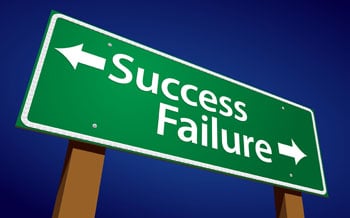If you have followed my blog, read our sales newsletters or listened to our audio sales brews, then you’ve heard me talk about success formulas. The concept is pretty simple. If you follow the steps and execute the required activities to the required standards, you will be successful. Well, guess what? It doesn’t always work that way, especially if you are missing critical pieces of the process.

For most people, the success formula is a new exercise designed to create a logical and systematic approach to their sales process. It requires that one has clearly mapped the sales process and has some idea of what the conversion rates are from one step of the process to the next step of the process. It also requires an exercise where personal goals are identified and there is a financial or monetary value attached to the identified goals.
But… goals aren’t enough. There are a couple other critical criteria you must meet.
1. The goals have to be non-negotiable, AND...
2. The sales person has to be willing to do everything possible to succeed.
Without these criteria being met, then the success formula becomes just an exercise to complete rather than a fundamental business process that will increase the opportunity for success.
Once non-negotiable goals and a “whatever it takes” attitude have become established, then you can go about the process of building a success formula. This leads us to the next challenge and that challenge is data. Unless you’ve collected data on your sales results, then you won’t know the conversion rates or the amount of activity required to be successful. The success formula then becomes a “guess at success”. And that can be the problem with success formulas.
If you have gone through this process and you aren’t at the level of success that you had predicted, then you’ve got to back to the drawing board and re-calculate your formula. If you aren’t successful, it can be attributed to one of the following 3 things:
1. Lack of performance of the required activity – In other words, just a flat-out lack of effort.
2. The formula was wrong because the assumptions of conversion ratios or average size accounts were wrong or…
3. The goals were actually negotiable and you, the sales person, are not doing everything possible to succeed. Not just in effort, but also in those steps in the sales process that are difficult or contrary to your personal belief systems, your buy cycle, or your need for approval.
The sales formula was never designed to be a perfect solution to cure poor or failing sales performance. The intent again is to provide a sales professional with a logical and progressive way to approach selling. If you are executing your formula at 100% and you aren’t getting the results, review the goals, the assumptions and the conversion ratios.
Make needed adjustments and go back to work. One important thing to keep in mind: If you are not performing as effectively as you thought you would, then you must examine what it is that you’re failing to do to get the appropriate conversion rate. Your course of action will always be one of two actions: work harder or work smarter.
The choice is yours.

